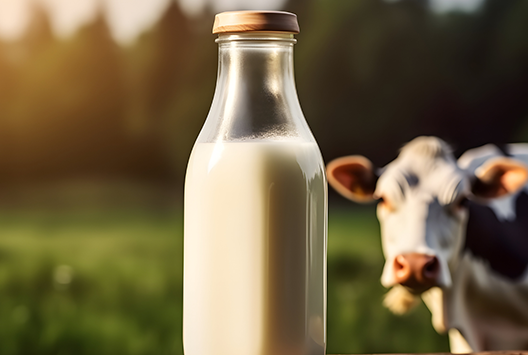
Moo-raculous Wonders: What Are the Benefits of Drinking Cow's Milk?
Similar
When you were younger, your parents probably always told you to drink milk before bedtime. But have you ever stopped to think about why this is important?
Now that you're older, you might not be keen to drink a glass of cow's milk, and another beverage has probably replaced it as your favorite. But there are a number of different health benefits that come with drinking milk, so maybe it’s time to bring the old habit back. You could also consider adding milk to your diet by incorporating it into different meals such as smoothies, oatmeal bowls, desserts, and much more.
Benefits of drinking cow’s milk
Cow's milk is a popular and widely used beverage that is a staple in many households. Not only is it packed with nutrients and vitamins, but it also offers your body a range of health benefits that you may not have thought of before.
1. It’s a good source of essential nutrients
Cow's milk is a great source of calcium, phosphorus, potassium, magnesium, and vitamin A — all of which are necessary for proper body functioning. These nutrients can also help keep your bones and teeth strong and healthy. What's more, cow's milk is a relatively low-calorie source of protein, which can help you feel full for longer.
2. It improves heart health
A number of studies have linked cow’s milk consumption to improved heart health. Cow’s milk is high in both monounsaturated and polyunsaturated fats, which are believed to be beneficial for reducing "bad" LDL cholesterol, which is critical for maintaining good heart health.
3. It supports weight loss
Cow's milk is an excellent source of protein and calcium, two critical nutrients for weight loss. It is also low in fat and calories, which can help you maintain a healthy weight.
Protein is one of the most important macronutrients for weight loss, as it helps to keep your metabolism running at its peak. Studies have shown that increasing your protein intake can help reduce body fat while preserving muscle mass. Cow's milk is one of the best protein sources, containing 8.5 grams per cup.
Calcium is another essential macronutrient for weight loss, as it helps regulate your metabolism. Studies have shown that calcium can help reduce body fat and preserve muscle mass, which is essential for successful weight loss. Cow's milk is one of the best sources of dietary calcium, containing approximately 280 milligrams of calcium per cup.
Cow's milk is also low in fat and calories, which makes it an ideal beverage for weight loss. One cup of whole milk contains 8 grams of fat and 150 calories, while one cup of skim milk contains 0.5 grams of fat and only 90 calories.
4. It boosts the immune system
Whey protein is the most important component of cow's milk that is responsible for boosting the immune system. Whey protein is a complete protein, which means it contains all of the essential amino acids necessary for proper body functioning. The whey protein in cow's milk helps to stimulate the production of antibodies, which are responsible for fighting off infection and illness. Additionally, whey protein helps reduce inflammation in the body, which is essential for keeping the immune system functioning at its best.
5. It improves bone health
Calcium is essential for strong bones, and cow's milk is an excellent source of this vital mineral. Studies have found that drinking cow's milk regularly can help increase bone density, which is important for preventing osteoporosis, a condition that can cause bones to become weak and brittle. The calcium in cow's milk can also help reduce the risk of fractures in children and adults.
In addition to providing calcium, cow's milk is also a good source of vitamin D, which helps the body absorb and use calcium. It’s also a good source of phosphorus and magnesium, which are important for bone formation. Cow's milk is also a source of potassium - an electrolyte that helps regulate calcium and phosphorus levels in the body.
Moo-ve over, it’s time for a glass of milk
Overall, there are many great reasons to drink cow's milk regularly as you’ve read above. Your immune system and body will certainly benefit from adding cow’s milk to your diet. So, if you're looking for a healthy and nutritious beverage, cow's milk is a great choice. It is also important to make sure you're getting your milk from a trusted dairy and beverage company.
Baladna is a trusted dairy and beverage company in Qatar that offers only the highest quality products. Check out our dairy products today!



